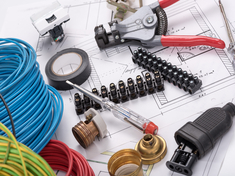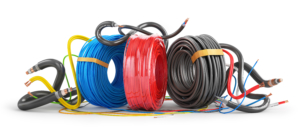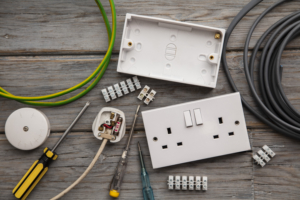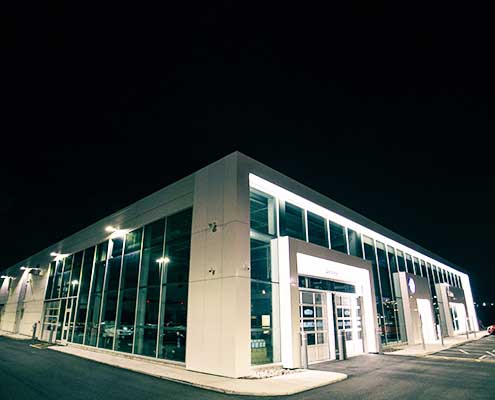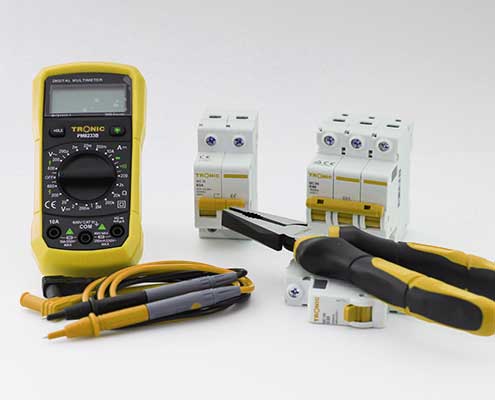What are the requirements for electrical installation?
Electrical Installation Requirements
Want to learn about the basics of electrical installation requirements? Read this comprehensive guide for key tips and advice on techniques you need to know.
Electrical installation can seem like a daunting task, but with the right knowledge it can be simple and safe. Therefore, we will provide you with key tips and advice on electrical installation techniques, as well as safety procedures to follow to ensure your home is electrically safe.
You may need electrical work done, but you could find yourself wondering, what exactly is an electrical installation? What are my electrical installation requirements? Who should I be choosing to undertake these works?
The process can seem intimidating to people who have never received any electrical training or have little electrical knowledge.
We have a range of electrical information on many other areas in our other articles. Check these out also
What Is a Commercial Electrical Installation?
In essence, as defined by the English Dictionary, an installation is a place that contains equipment and machinery which are being used for a particular purpose.
Therefore, an electrical installation is the combination of electrical equipment installed from a common electrical supply to fulfil a particular purpose.
Electrical installation requirements are those in the process of constructing an electrical system for a home or office. It involves analytical methods, proper selection of materials and equipment, as well as important knowledge about regulations and standard codes. In most cases, it is highly recommended to hire a professional electrician to perform any electrical installation projects in your home or commercial space.
The correct installation of electrical equipment is essential to the reliability and safety of electricity to power your business, office, or home.
Understand Common Components and Components Needed for an Electrical Setup
When it comes to electrical installation requiremnets, it’s important to understand the common components and components needed for an electrical setup. These components include main switchboard distribution, circuit breakers, cable ties, conduit and trunking system, light switches and power points. It’s also important to consider other additional components like lighting protection systems and wiring diagrams which may be required depending on the complexity of the project.
Electrical Installation Requirements
There are several components that are assembled to make up your electrical installation. These components include:
- Electricity meters. You might think that an electrical installation starts in your business office or home, but it actually starts on the streets. The meter tallies how much electrical load is run to your home or office. Sometimes, a load center is also identified as a “meter.”
- Line Pole. A line pole is necessary to run the electricity from the power that is run through the meter to your office or home. Older lines are usually found running above ground. Newer, more modern systems will have the lines running underground.
- Circuit breakers. A circuit breaker box is located in your home or office and will break up the electricity into different circuits that will run throughout your building.
- Electrical Wiring. The wirings consist of the electrical cables and circuits that run from the breakers to the outlets. These wires can be installed in various different configurations depending on the expected usage and flexibility required
- Fixtures, lights, and appliances. All of the outlets, lighting fixtures, and appliances that receive electrical energy are also considered to be a part of the electrical installation.
How an Electrical Installation Works
The above 5 components then work in the following way
- A transmission source or power source of the electricity will run electricity through the meter.
- The meter will track the amount of power your office or home utilizes.
- Once the power enters the building, it will go to the circuit breaker box.
- The circuit breaker box is responsible for breaking up the electricity into different circuits that then run through different parts of your home.
- Once the power is broken up, it is directed to different outlets, lights, and appliances throughout your building.
So, the basic components of your electrical installation are the meter, breaker panel, circuits, and wires. Therefore, all of these elements should be designed and installed by a fully qualified electrician. Furthermore, any of these components could need repair or maintenance by a professionally qualified electrician.
Learn and Understand Electrical Regulations, Standards and Safety Procedures.
When undertaking any electrical installation work it’s crucial to understand the regulations and standards of the electrical industry. For example, familiarise yourself with important locally wirings standard requirements, and local building codes. It’s also important to research and adhere to safety procedures, particularly when working on commercial sites which require specific OHS documentation. Following safety procedures ensures protection for both the electrician and everyone occupying the premises.
Become Familiar with the Process of Planning an Electrical Installation Project.
To ensure the best outcome and meet safety regulations, a good electrical installation project should always begin with research. Ask questions to find out more about the job itself and its requirements. As well as obtaining any necessary documentation like permits or clearances from the local council, it is also important to plan out details such as your operating procedures for moving and managing power tools during the project. Good planning will reduce stress on the job and help you to complete your electrical installation process efficiently.
Ensure your Contractor has the Essential Tools Used for Electrical Installation Work.
Electrical installation jobs can be risky and require special tools for safety and accuracy. Before beginning any electrical work, ensure your contractor has not only the correct certification and tooling but also the correct safety and access equipment. The wrong kind of access equipment such as standard ladders can put the contractor and your workforce at risk. Furthermore, it is also important they have the right type of electrical safety gear such as protective eyewear and insulated gloves, as they need to be safe when working in your building
How to Plan an Electrical Installation Project
Electrical installation projects require careful planning in order to be a success. Below, you can learn what you need to know for a successful electrical installation, from understanding the tools and supplies required to being aware of potential hazards.
Make sure your next electrical installation project runs smoothly with these helpful tips. Discover what you need to know for a successful job completion when taking on an electrical contractor.
Gather Information: What Does the Job Entail?
Before starting any electrical installation project, be sure to gather all of the necessary information. Do research on what your commercial space will look like. I.e a desk layout and plan. Therefore, from this plan your contractor can plan the type of wiring and materials they will need. Futhermore, what kind of power load the system will require. In addition, they can determine how the work can be done safely and create a list of tasks and thus a quotation. Furthermore, a Risk Assessment and Method Statement should be provided to you . Make sure between you to keep in mind any potential hazards that may arise during installation and how to manage them.
Outline and Schedule the Work That Needs to Be Done.
Before beginning an electrical installation, it’s important to carefully plan and map out the steps that need to be taken. This includes outlining any tasks required, as well as when they will be completed. Create a timeline of when each step should begin and end, as well as a list of materials and tools you will need. For larger jobs, create a master plan that outlines the whole project in detail, with estimated completion times for each category of work. Doing so will help ensure your installation project runs smoothly and efficiently.
Get Acquainted with Building and Electrical Codes.
It’s a good idea to familiarize yourself with local building and electrical codes along with your electrical contractor before your project begins. These requirements will vary depending on the job site, so be sure to check local ordinances ahead of time with your project manager. Knowing these regulations will ensure all work is done safely and compliantly. Be sure all paperwork is up-to-date and checked by the appropriate government body prior to beginning any installation. These will be part of your sign off and ongoing paperwork for your commercial space. Furthermore, these will ensure upcoming service and maintenance are easily undertaken and understood.
What are the Requirements for Maintenance or Repairs?
If your electrical installation looks worn or sloppy, it could be in need of maintenance or repair. There are some things that you can look out for to determine if you require a professional electrician to look at the electrical installation in your home or office. These signs include:
Scorch marks.
Even if there wasn’t a fire, if you see scorch marks around any electrical boards, they could be dangerous. Therefore you will want to call a qualified electrician to check out your electrical installation.
Odd noises coming from machines.
If you hear odd noises coming from your electrical system or appliances, damage could have occurred. Subsequently, it could be a hazard. Call a professional electrician as soon as possible to check on your electrical system.
Burnt smells or odours.
If you smell anything burning, there could be an issue with your wires. Thus leading to danger to your building. In addition, it could even possibly lead to a fire. Again, you will want to call a qualified electrician to check out your electrical wires.
Overheating appliances.
This could be an issue with the appliance or with your electrical system. To be safe, call a professional electrician to investigate any issues with your electrical installation.
Flickering lights.
Often flickering lights have to do with the unit. However, if not, it could also be a wiring issue. In this case, you want to make sure you have a qualified electrician investigate any potential problems with your electrical installation.
Finding water around electrical components.
Water can do a great deal of damage to electrical installations. If you find water around electrical fittings, such as outlets or the circuit breaker, you will want to have it checked out immediately as it can be a hazard. Call a qualified electrician to come to look at the issue ASAP.
Electrical installation requirements and any ongoing maintenance and repairs should always be undertaken by a qualified electrician. Therefore our professionals can help make sure your electrical installation is safe and well-repaired. If you have any issues, do not hesitate to call us.
Are there different types of electrical installation requirements?
There are actually two main types of electrical installations – residential and commercial. Therefore it’s important to understand the difference between these two types of electrical installations. Furthermore, you will want to understand the difference so that you can hire the right professional to complete your electrical work.
- Residential electrical installations. Residential electrical installations are done to private residencies, such as your home. A residential electrical installation will generally deal with circuit breakers, wall outlets, and major household appliances such as washing machines and dishwashers. You will want to hire an electrician well-versed in residential electrical work to take care of your projects.
- Commercial electrical installations. Commercial electrical installations generally involve larger-scale buildings such as office buildings, shopping malls, factories, and corporate campuses. A commercial electrical installation is much more complex than a residential job. It will require more power and specific components. You will want to hire an electrician with experience doing commercial installations to make sure the job is done right.
As we are primarily a commercial electrical company we will discuss below so additional best practices for commercial buildings
Best Practices for Electrical Installations in Commercial Buildings
Electrical installations are a key part of any commercial building. Following best practices for the installation and maintenance of electrical systems is essential to ensure optimal performance, functionality and safety
Hire Licensed Professionals.
Working with qualified and licensed professionals is one of the most important best practices to follow when it comes to electrical installation requiremnets in commercial buildings. Make sure that you hire an experienced electrician that is qualified to handle your specific project and has the necessary insurance, licensing and training. This will ensure that all work meets local building codes and standards for power distribution, voltage levels, wiring spacing and other important safety considerations.
Plan Your Project Carefully.
Before starting any electrical installation project in a commercial building, it is important to plan carefully. Start by identifying the tasks that need to be completed and assessing the materials and tools required for each of them. Carefully review local building codes, power distribution standards and safety protocols to make sure that your project meets all applicable requirements before beginning. When planning your project, keep in mind any further maintenance or upgrades necessary for long-term performance and ensure that you have the budget and capacity to meet these needs as well.
Review Electrical Code Requirements.
Before beginning your project, it is essential to check that all electrical installation requirements will follow the relevant codes , as established by local and national building regulations. In particular, be aware of emergency lighting and fire safety requirements, which mandate the presence of emergency/exit lights in specific locations throughout the building. Ensure that any electrical installation takes account of such requirements and that available resources are sufficient to meet them.
Take Precaution when Working on an Existing System.
When working on electrical installations in an existing building, there are a number of best practices to observe. Take extra precautions when removing covers, junction boxes and safety devices. Ensure that all exposed wiring is properly labelled and tested before connecting to it. Isolate the system being worked on to reduce the chances of hazardous currents reaching other areas of the building. Double check connections to ensure they are secure, in accordance with good engineering practice.
Prioritize Safety When Connecting Wiring, Outlets & Switches Strictly Adhere to Manufacturer Guidelines for Electrical Devices and Components.
When connecting wiring, outlets and switches, it is essential to prioritize safety. Follow manufacturer’s guidelines for electrical devices and components and have a qualified electrician inspect the wiring after installation. The use of surge protection products can add an extra layer of protection for the building’s critical systems. It is important to ensure that all new electrical installations in a commercial building comply with applicable local codes and regulations.
Why should I hire a professional?
Electrical work can be dangerous. Therefore you will always want to hire a qualified electrician to do your electrical installation for both residential and commercial work. There are many reasons to hire a professional electrician including:
- Doing electrical work without the proper knowledge and training can be very dangerous. Our electricians are well trained with years of experience to make sure the job gets done right.
- Electrical installation requiremnets can often require permits. A licensed professional will make sure that the job meets any official requirements and the work often comes with a warranty.
- Cost-effective. DIY electrical work can often cost you more in the long run due to issues that can arise and a need for constant repairs. Therefore hiring a professional to begin with will save you time and money in the long run.
Our professionals are here to help you with all your electrical installation needs. Call us today!
For additional electrical articles please visit our main BLOG page here

